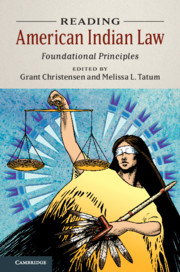Book contents
- Reading American Indian Law
- Reading American Indian Law
- Copyright page
- Dedication
- Contents
- Editors and Contributors
- Preface
- Acknowledgments
- Introduction
- Part I Core Concepts
- Part II Voices
- Part III Property
- Part IV (Mis)Understandings
- 13 Dependent Sovereigns: Indian Tribes, States, and the Federal Courts
- 14 There Is No Federal Supremacy Clause for Indian Tribes
- 15 American Indians, Crime, and the Law
- 16 Factbound and Splitless: The Certiorari Process As Barrier to Justice for Indian Tribes
- Book part
- References
16 - Factbound and Splitless: The Certiorari Process As Barrier to Justice for Indian Tribes
from Part IV - (Mis)Understandings
Published online by Cambridge University Press: 11 December 2019
- Reading American Indian Law
- Reading American Indian Law
- Copyright page
- Dedication
- Contents
- Editors and Contributors
- Preface
- Acknowledgments
- Introduction
- Part I Core Concepts
- Part II Voices
- Part III Property
- Part IV (Mis)Understandings
- 13 Dependent Sovereigns: Indian Tribes, States, and the Federal Courts
- 14 There Is No Federal Supremacy Clause for Indian Tribes
- 15 American Indians, Crime, and the Law
- 16 Factbound and Splitless: The Certiorari Process As Barrier to Justice for Indian Tribes
- Book part
- References
Summary
Factbound and Splitless: recognizes the US Supreme Court’s preeminent role in announcing federal common law that governs the relationship between tribes, states, and the federal government. However, because the Supreme Court only hears cases that can earn four votes for certiorari, the direction of federal Indian law is controlled as much by the choice to hear a case as by the ultimate decision that is issued. Fletcher examines the Supreme Court’s behavior in Indian law cases at the certiorari stage in order to explain how modern Court behavior is changing the landscape of Indian law without even deciding some of the most important legal issues.
- Type
- Chapter
- Information
- Reading American Indian LawFoundational Principles, pp. 381 - 402Publisher: Cambridge University PressPrint publication year: 2019



